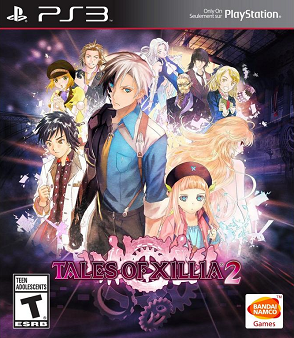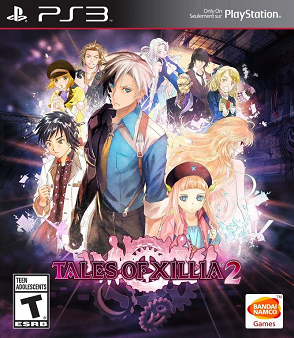Existing User Log In
New User Registration
Register for a free account to gain full access to the VGChartz Network and join our thriving community.





America - Front


America - Back

Tales of Xillia 2 takes place several years after the events in the original game. You play as Ludger, who wants to follow in his brother's footsteps as an agent of Spyrios, but he's a distinctly better cook than he is fighter. After failing the test to become an agent, Ludger finds himself charged with protecting a small girl called Elle during a terrorist attack on a train at his first day of work as a cook. Although now physically joined, tensions remain high between the worlds of Rieze Maxia and Elympios and an impending peace treaty has everyone on edge. You quickly find out that Ludger is not the weakling he appears to be; he actually has special powers that give him strength in battle, although they come with a difficult burden.
The overall plot of Tales of Xillia 2 is certainly enjoyable. There are moral gray areas - an aspect of story-telling that is always easy to appreciate in video game narratives - although this sense of muddied morality does break down towards the end with final moments that are presented very much from a black and white perspective. The original Tales of Xillia has two main characters, which increases the game's replay value. Tales of Xillia 2 takes a slightly different approach and is instead bolstered by choices that must be made during conversations and at certain key points. You only ever have two options to choose from, and for the most part the difference is minimal, but in a couple of instances these choices will either have a marked effect on the order of events or will change things entirely.
One of the game's most controversial aspects will no doubt be its progression system, which leaves Tales of Xillia 2 feeling lacking in exploration. Not only do you re-visit locations already explored in the first title, but new chapters are blocked out financially (rather than you having to work through an area geographically in order to open up new chapters). The narrative explanation for this is that Ludger and Elle have accrued a large amount of debt in the form of the medical expenses which followed the train incident, and in order to continue you'll have to make regular re-payments of slowly increasing amounts. After a certain amount of money has been paid off you're allowed to explore new areas by your creditors.
It's an interesting justification for the usual “you can't go there yet” mechanic that is frequently used in the RPG genre but it's a poor replacement for the genre's more traditional progression systems in reality. Whereas in the previous game areas would be separated by treks through unknown lands, now you're just toiling around locales you explored in Tales of Xillia and grinding to make money. The great poet Cinderella once said you “don't know what you got 'til it's gone” and Tales of Xillia 2 has taught me just how much I enjoy the exploration found in RPGs.
The battle system is similar to the one featured in the first game, albeit with the notable addition of the new main character. Ludger has three different weapons he can switch between and a super power mode on a long cooldown timer. His three weapons aren't just for show; they're used strategically to exploit the strengths and weaknesses of your enemies. Usually you can simply power through enemies, even on the harder difficulty, but boss battles almost invariably force you to take their weaknesses into account if you're to defeat them.
If you are able to take hit an enemy where they're weak then a damage multiplier will appear that can be chained into a finisher. This is an essential combat technique if you want to take on some of the game's more challenging bosses or elite monsters without stepping down the difficulty. But that does bring me to one feature found in Tales of Xillia 2 which is well worth noting - you can change the difficulty level whenever you like, allowing you to experiment with difficulty levels very easily. On the whole, although I do wish that there was more of an emphasis on dodging and blocking damage put out by the enemies, like the combat found in Tales of Graces F, the combat system is fun.
Although the re-use of areas from Tales of Xillia may lead one to think that this sequel was made on a much lower budget, fully voiced skits do manage to make a return, and for that I couldn't be happier. These brief interludes are a welcome break from the more serious plotlines - they feature a little joshing between your party's characters, which has traditionally been one of the strongest aspects of the Tales series - and the voice acting helps to do them justice. Elle's voice acting does suffer from some of the issues that child characters in video games often face, but she is fortunately only slightly annoying. Elsewhere, Tales of Xillia 2 looks and feels almost exactly like its predecessor, with forgettable music and visuals that are serviceable but do little to impress.
It took me 32 hours to play through the main storyline of Tales of Xillia 2, but there is a reasonable amount of content to be found beyond that if you're so inclined. Each returning character has separate, optional chapters that detail what they got up to between the two games; there's an extra dungeon to be found after completion; and you have to option to play through again using New Game+ where you can make different choices to see how each one affected the storyline. That said, Tales of Xillia 2 is notably shorter than the original and the lack of an exploration element certainly left me feeling like something was missing.
Tales of Xillia 2 is not a poor sequel, but it certainly doesn't live up to the original. I enjoyed the main storyline and its moral quandaries, and the battle system is as fun as ever, but a lackluster progression system and lower overall value proposition makes it only really worth recommending to avid fans of its predecessor.










|
|
Squall1989
posted 29/04/2016, 01:20
I liked this much more than Tales Of Zestiria. It will probably reach 1 Million in some months. Message | Report |
|
|
|
|
|
|
|
|
|
|
|
|
|
|
|